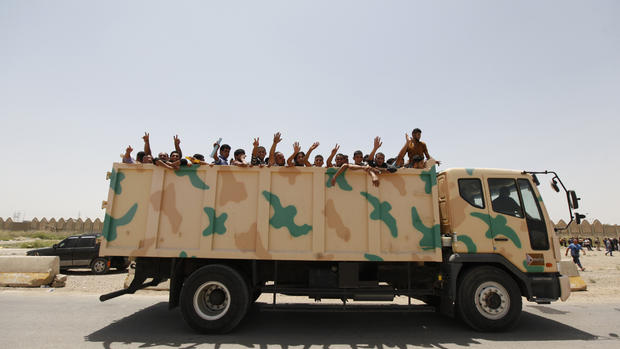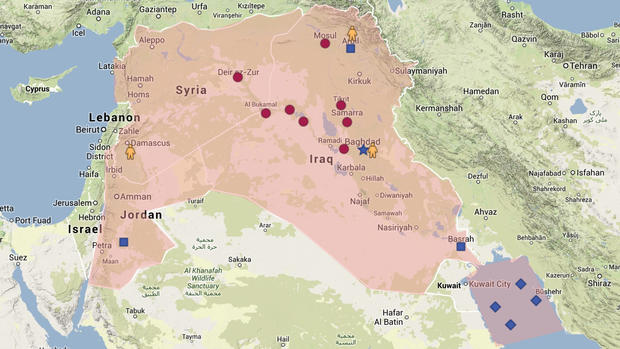Iraq refinery targeted amid fears foreign workers were seized
BAGHDAD -- Iraqi security forces battled insurgents targeting the country's main oil refinery and said they regained partial control of a city near the Syrian border Wednesday, trying to blunt a weeklong offensive by Sunni militants who diplomats fear may have also seized some 100 foreign workers.
In a televised address to the nation, Prime Minister Nouri al-Maliki struck an optimistic tone and vowed to teach the attackers a "lesson" - even though Iraqi soldiers abandoned their posts in the wake of the initial militant offensive.
"We have now started our counteroffensive, regaining the initiative and striking back," al-Maliki said.
The campaign by the al-Qaeda-inspired Islamic State of Iraq and Syria, or ISIS, has raised the specter of the sectarian warfare that nearly tore the country apart in 2006 and 2007. The relentless violence that followed the 2003 U.S.-led invasion now haunts those trying to decide how to respond.
At the White House, President Obama briefed lawmakers Wednesday on what options the U.S. could pursue.
CBS News national security correspondent David Martin reports that the U.S. was conducting around-the-clock surveillance missions over Iraq using both manned and unmanned aircraft, including F-18s from the USS George H.W. Bush, which arrived in the Persian Gulf over the weekend.
The U.S. is pressing al-Maliki to undermine the insurgency by making overtures to Iraq's once-dominant Sunni minority, which has long complained of discrimination by al-Maliki's government and excesses by his Shiite-led security forces.
Bayan Jabr, who was interior minister in 2006 during the worst sectarian violence in Iraq, told CBS News correspondent Clarissa Ward that "all the Iraqis must be united. If there is a government can do that, I think we can solve 50 percent of the problem."
Pointedly, however, Jabr said al-Maliki's government was not up to the task.
Al-Maliki, a Shiite, has consistently rejected charges of bias against the Sunnis and has in recent days been stressing the notion that the threat posed by ISIS, also known as the Islamic State of Iraq and the Levant, or ISIL, will affect all Iraqis regardless of their ethnic or religious affiliations. He appeared Tuesday night on television with Sunni leaders and politicians as a sign of solidarity.
The prime minister's relatively upbeat assessment came as the Iraqi military said its forces regained parts of the strategic city of Tal Afar near the Syrian border, which Islamic State fighters captured on Monday. Its closeness to the Syrian border strengthens the Islamic State's plan to carve out an Islamic caliphate, or state, stretching across parts of the two countries.
It also came hours after the chief military spokesman, Lt. Gen. Qassim al-Moussawi, said government forces repelled an attack by militants on the country's largest oil refinery at Beiji, some 155 miles north of the capital, Baghdad.
Al-Moussawi said 40 attackers were killed in fighting there overnight and early Wednesday.
Video footage posted online shows smoke billowing in the background from an area near the refinery. Another clip uploaded by ISIS shows its heavily armed fighters arriving in the town, waving black flags out of cars. The videos appear genuine and correspond to Associated Press reporting of the events depicted.
There was no independent confirmation either of al-Moussawi's claims or those of the Iraqi military's retaking neighborhoods in Tal Afar. The areas are in territories held by insurgents that journalists have not been able to access.
The Beiji refinery accounts for a little more than a quarter of the country's entire refining capacity - all of which goes toward domestic consumption for things like gasoline, cooking oil and fuel for power stations.
CBS News' Ward reports that if ISIS were able to seize the refinery, or halt operations there for a long period of time, it could mean massive lines for gas and power outages in parts of Iraq already gripped by chaos.
Meanwhile, the Indian government said 40 Indian construction workers have been seized near Iraq's second-largest city, Mosul, which ISIS and allied Sunni fighters captured last week. Roughly 10,000 Indian citizens work and live in Iraq, with only about 100 in violent, insecure areas like Mosul, according to Foreign Ministry spokesman Syed Akbaruddin.
And the Turkish Foreign Ministry said its diplomats were investigating a Turkish media report that militants grabbed 60 foreign construction workers, including some 15 Turks, near the northern Iraqi oil city of Kirkuk.
Ethnic Kurds now control Kirkuk, moving to fill a vacuum after the flight of Iraqi soldiers. They too are battling the Sunni extremist militants.
On Wednesday, Kurdish security and hospital officials said that fighting has been raging since morning between Kurdish fighters known as peshmerga and militants who are trying to take the town of Jalula, in the restive Diyala province some 80 miles northeast of Baghdad.
Two civilians were killed and six peshmerga fighters were wounded, according to the officials, who spoke on condition of anonymity because they were not authorized to speak to the media.
Also in the Kirkuk area, Sunni militants attacked a cluster of villages Tuesday night, killing at least 20 ethnic Turkomen Shiites and burning 13 Shiite homes, said Shalal Abdoul, the mayor of the nearby town of Tuz Khormato. Two more Tukromen Shiites remain missing. Following the fighting, residents of the three villages left for Tuz Khormato, which is held by the peshmerga.
Meanwhile, Doctors Without Borders said shelling in the city of Tikrit on Friday caused severe damage to one of its clinics, disrupting medical care for tens of thousands of people displaced by the violence.
The Sunni militants of the Islamic State have vowed to march to Baghdad and the Shiite holy cities of Karbala and Najaf in the worst threat to Iraq's stability since U.S. troops left in late 2011. The three cities are home to some of the most revered Shiite shrines. The Islamic State also has tried to capture Samarra, a city north of Baghdad and home to another major Shiite shrine.
Iran, a neighboring Shiite country, already has seen thousands volunteer to defend the shrines. Iranian President Hassan Rouhani, speaking Wednesday to a crowd gathered at a stadium near his country's border with Iraq, said that the Islamic State and others would be defeated.
"We declare to all superpowers, their mercenaries, murderers and terrorists that the great Iranian nation will not miss any effort in protecting these sacred sites," Rouhani said.
The U.S. and Iran are discussing how the longtime foes might cooperate to ease the threat from the al-Qaeda-linked militants. Still, the White House ruled out the possibility that Washington and Tehran might coordinate military operations in Iraq.
Some 275 armed American forces are being positioned in and around Iraq to help secure U.S. assets as Mr. Obama also considers an array of options.
Iraqi Foreign Minister Hoshyar Zebari said Wednesday that his country had formally asked the U.S. to launch airstrikes against positions of the Islamic State.
President Obama wants to send a small contingent of U.S. special forces troops into Iraq for the first time since the U.S. military pulled out of the country to help train and advise the domestic forces.
A White House official told CBS News Wednesday morning that Mr. Obama has not made a final decision on whether to conduct airstrikes in Iraq but did not deny reports that such action was no longer the focus of the administration's strategy for the immediate future.
"The president has not made a decision," the official told CBS News in a written statement. "At this stage, the only thing that remains ruled out is more U.S. troops in a combat role."
"The solution that is needed is an Iraqi one," added the official. "Any U.S. military options are in support of that strategy."
CBS News chief White House correspondent Major Garrett says that while Mr. Obama has made it clear he will not put boots on the ground in Iraq for combat, he now believes the special forces are needed in the country to develop better intelligence on the Sunni insurgents, should air strikes be ordered.
Ahead of his meeting at the White House, Senate Majority Leader Harry Reid said the U.S. had no business sending troops into the midst of what he called Iraq's civil war.
"It's time for the Iraqis to resolve it themselves," said Reid, a Nevada Democrat. Taking on Republicans who have blamed the current violence on the withdrawal of U.S. forces, Reid said, "Those who attack President Obama for bringing our troops home from Iraq are wrong and out of step with the American people. After a decade of war, the American people have had enough."

